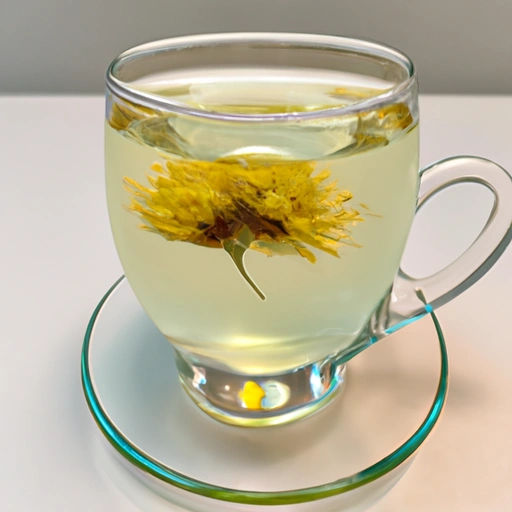Chrysanthemum Tea
Chrysanthemum Tea Recipe - Traditional Chinese and Singaporean Beverage
Introduction

Chrysanthemum tea is a popular herbal tea made from dried chrysanthemum flowers. It has a delicate floral flavor and is often enjoyed for its calming and soothing properties.
History
Chrysanthemum tea has been consumed for centuries in China and other Asian countries for its medicinal benefits. It is believed to have cooling properties and is often used to help alleviate symptoms of the common cold.
Ingredients
How to prepare
- Prepare the tea following the usual method and sweeten it with rock sugar according to your preference.
Variations
- You can add other herbs or spices to your chrysanthemum tea, such as ginger or cinnamon, for added flavor.
Cooking Tips & Tricks
When preparing chrysanthemum tea, be sure to use high-quality dried chrysanthemum flowers for the best flavor. You can adjust the sweetness of the tea by adding more or less sugar to taste.
Serving Suggestions
Chrysanthemum tea can be enjoyed hot or cold, depending on your preference. It pairs well with light snacks or desserts.
Cooking Techniques
To make chrysanthemum tea, simply steep the dried flowers in hot water for a few minutes, then strain and sweeten to taste.
Ingredient Substitutions
If you don't have chrysanthemum flowers, you can use other dried flowers or herbs to make a similar herbal tea.
Make Ahead Tips
Chrysanthemum tea can be made ahead of time and stored in the refrigerator for up to a few days.
Presentation Ideas
Serve chrysanthemum tea in a clear glass teacup to showcase the beautiful color of the tea.
Pairing Recommendations
Chrysanthemum tea pairs well with light and refreshing dishes, such as salads or seafood.
Storage and Reheating Instructions
Store any leftover chrysanthemum tea in the refrigerator and reheat gently on the stovetop or in the microwave before serving.
Nutrition Information
Calories per serving
A serving of chrysanthemum tea typically contains around 30 calories.
Carbohydrates
Chrysanthemum tea is low in carbohydrates, making it a great option for those looking to reduce their carb intake.
Fats
Chrysanthemum tea is fat-free, making it a healthy choice for those watching their fat intake.
Proteins
Chrysanthemum tea does not contain any protein.
Vitamins and minerals
Chrysanthemum tea is rich in vitamins and minerals, including vitamin C and potassium.
Alergens
Chrysanthemum tea is generally considered safe for most people, but those with allergies to flowers or pollen should exercise caution.
Summary
Chrysanthemum tea is a low-calorie, fat-free beverage that is rich in vitamins and minerals.
Summary
Chrysanthemum tea is a delicious and soothing herbal tea that is easy to make and can be enjoyed hot or cold. It is low in calories and fat, making it a healthy beverage choice.
How did I get this recipe?
I can still remember the exact moment I discovered the recipe for Chrysanthemum Tea. It was a warm summer day, and I was visiting my dear friend Mei Ling in her beautiful garden. The air was filled with the sweet fragrance of blooming chrysanthemums, and I couldn't help but admire their delicate petals in shades of yellow, pink, and white.
As we sat on her porch sipping on a refreshing glass of iced tea, Mei Ling shared with me her secret recipe for Chrysanthemum Tea. She explained that chrysanthemums have been used for centuries in traditional Chinese medicine for their healing properties and believed to promote relaxation and reduce inflammation. Intrigued by the idea of making my own herbal tea, I asked Mei Ling to show me how to prepare it.
She led me to her kitchen, where she carefully selected a handful of fresh chrysanthemum flowers from her garden. She rinsed them gently under cold water and placed them in a teapot with boiling water. Mei Ling instructed me to let the flowers steep for about 10 minutes, allowing the natural oils and aroma to infuse the water.
Once the tea was ready, she poured it into a cup and added a touch of honey for sweetness. I took a sip and was immediately transported by the delicate floral flavor of the chrysanthemum tea. It was light, refreshing, and soothing to the soul.
From that day on, I was hooked on Chrysanthemum Tea. I began experimenting with different variations of the recipe, adding ingredients like ginger, lemon, and mint to create unique flavor profiles. I even started growing my own chrysanthemum plants in my backyard, ensuring that I always had a fresh supply of flowers to make tea.
Over the years, I shared the recipe with friends and family, who all marveled at the calming effects of the Chrysanthemum Tea. It became a staple in my household, especially during cold winter nights when a warm cup of herbal tea was the ultimate comfort.
As I continued to perfect the recipe, I learned to adjust the steeping time and ratio of flowers to water to create the perfect balance of flavor and aroma. Each cup of Chrysanthemum Tea became a labor of love, a reminder of the friendship that blossomed in Mei Ling's garden that summer day.
Now, as I sit in my own garden surrounded by blooming chrysanthemums, I can't help but feel grateful for the gift of this recipe. It has brought me joy, comfort, and connection to nature in ways I never thought possible. And as I pour myself a cup of Chrysanthemum Tea and take a sip, I am reminded of the simple pleasures in life that bring us together and nourish our souls.
Categories
| Chinese Recipes | Chinese Sugar Recipes | Dessert Recipes | Singaporean Desserts | Singaporean Recipes |